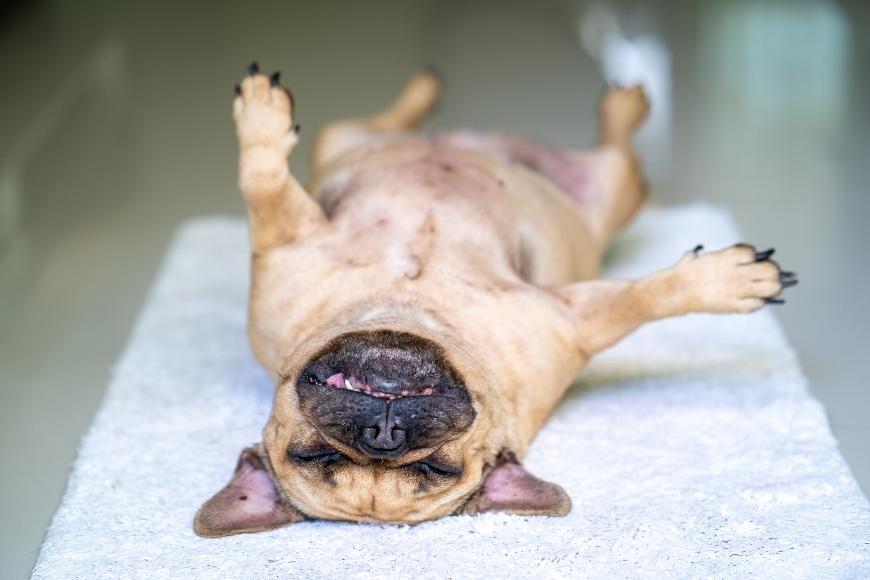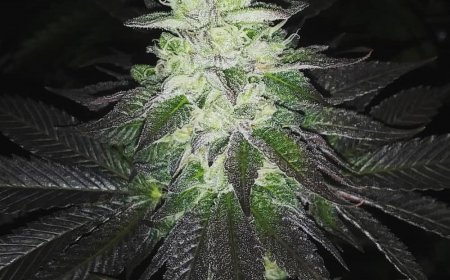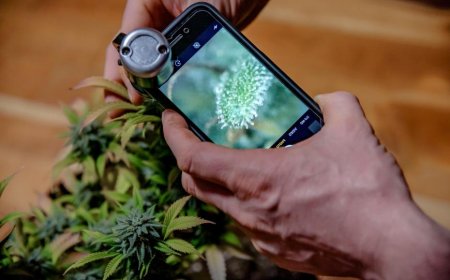What Happens When Dogs Eat Magic Mushrooms?
Learn what happens when dogs eat magic mushrooms, the risks, symptoms of poisoning, and tips for pet safety around these substances.

What happens when dogs eat magic mushrooms? This is a question that many young adults growing and using recreational drugs may not consider, but it's essential to be aware of the potential dangers. In this blog post, we will delve into the effects of mushroom ingestion in dogs, symptoms of poisoning, toxic mushrooms for our furry friends, and what veterinary care entails.
Additionally, we'll discuss preventive measures to keep your pets safe from these mind-altering substances. By heightening understanding of the effects psychedelic mushrooms can have on canine health, you can help create a safer atmosphere for both yourself and your pooch when it comes to experimenting with recreational drugs. So let's dive in and learn more about what happens when dogs eat magic mushrooms!
Table of Contents:
- Potential Effects of Mushroom Ingestion in Dogs
- Symptoms of Mushroom Poisoning in Dogs
- Toxic Mushrooms for Dogs
- Veterinary Care for Mushroom Poisoning in Dogs
- Preventing Mushroom Poisoning in Dogs
- Raising Awareness About Psychedelic Mushrooms and Dogs
- Promoting Dog Well-Being Regarding Psychedelic Mushrooms
- Conclusion
Potential Effects of Mushroom Ingestion in Dogs
When it comes to dogs and magic mushrooms, things can get hairy. Magic mushrooms contain a psychoactive compound called psilocybin, which can cause hallucinations, disorientation, and other symptoms in humans. Mild to severe reactions may occur in dogs when they ingest psilocybin-containing mushrooms.

Mild reactions may include regurgitation, looseness of the bowels, slobbering and transitory alterations in conduct such as agitation or languor. More severe reactions could involve tremors, seizures, elevated heart rate, or blood pressure fluctuations. These adverse effects are not only distressing for your pet but also potentially life-threatening if left untreated.
The severity of a dog's reaction to consuming psychedelic mushrooms depends on several factors: the type and amount of mushroom ingested; the size and weight of the dog; individual sensitivity; pre-existing health conditions; and whether any other substances were consumed alongside the mushroom (e.g., alcohol or medications).
It is important to note that not all wild mushrooms are toxic to dogs - some species have no harmful effects when eaten by pets. However, mushroom poisoning remains a significant concern for pet owners because many highly toxic varieties look similar to harmless ones. You should always be aware of your dog eating wild mushrooms when out and about on a walk.
In addition to psilocybin-containing fungi like Psilocybe cubensis ("magic" mushrooms), there are numerous other types of poisonous wild mushrooms growing that pose risks for dogs - including Amanita phalloides (death cap) and Inocybe spp., both known for their high toxicity levels. As a responsible pet owner, it's crucial to be aware of the potential dangers associated with mushroom ingestion and take appropriate precautions to protect your furry friend.
Symptoms of Mushroom Poisoning in Dogs
As a dog owner, it's crucial to know the signs that your furry friend may have ingested psychedelic mushrooms. The effects can vary depending on the type and amount of mushroom consumed, as well as the individual dog's sensitivity to psilocybin.
Common Symptoms
- Vomiting
- Diarrhea
- Lethargy or weakness
- Tremors or seizures
- Incoordination or difficulty walking (ataxia)
- Hallucinations (e.g., staring at walls, barking at nothing)
- Dilated pupils
If you think your pup may have eaten mushrooms, it is imperative to get them veterinary medicine and care right away. Mushroom poisoning can be life-threatening and requires prompt treatment.
Toxic Mushrooms for Dogs
Some mushrooms are safe for dogs, but others can be highly toxic and even lethal. It's crucial to recognize these dangerous mushrooms to protect your furry friend. Here are some common toxic mushroom species:
- Amanita phalloides (Death Cap)
- Amanita muscaria (Fly Agaric)
- Galerina marginata (Deadly Galerina)
- Inocybe spp.
Although not typically fatal, consuming certain wild mushrooms such as Galerina marginata and Inocybe spp., as well as Psilocybe cubensis and Panaeolus cyanescens, can lead to distress and discomfort in dogs. Although not typically fatal, consumption of psychedelic mushrooms may lead to severe distress and discomfort for your pet.
Identifying wild mushrooms can be challenging even for experienced mycologists. To ensure your dog's safety, prevent them from consuming any wild fungi during walks or outdoor activities.
If you grow magic mushrooms at home, keep them securely stored away from curious pets who might accidentally ingest them. Remember, even the slightest amount of psilocybin can have a drastic impact on your dog's health and wellbeing.
Being aware of the potential dangers associated with toxic mushrooms is essential for every responsible pet owner. By educating yourself about these hazardous fungi and taking preventive measures to keep your dog safe, you can help ensure their continued health and happiness.
Veterinary Care for Mushroom Poisoning in Dogs
If you think your pup has eaten psychedelic mushrooms, get veterinary help right away. Time is of the essence, as early intervention can significantly improve your pet's chances of recovery. Be prepared to provide information about the type and quantity of mushrooms consumed if possible.
Assessment and Treatment
Upon arrival at the vet clinic, a veterinarian will assess your dog's condition and may perform diagnostic tests such as blood work or imaging studies to determine the severity of poisoning. Treatment options vary depending on the symptoms exhibited by your dog but may include:
- Inducing vomiting: If ingestion occurred within two hours, veterinarians might induce vomiting using medications like apomorphine or hydrogen peroxide solution.
- Gastric lavage: In severe cases where inducing vomiting isn't effective or safe, gastric lavage (stomach pumping) can be performed under anesthesia to remove any remaining mushroom material from your dog's stomach.
- Activated charcoal administration: Administering activated charcoal helps bind toxins present in your dog's gastrointestinal tract and prevents further absorption into their bloodstream.
- Intravenous fluids and electrolytes: To combat dehydration caused by excessive drooling, diarrhea, or vomiting, intravenous fluids are given along with electrolyte supplementation when necessary.
- Symptomatic treatment: Your veterinarian will address specific symptoms such as seizures with anticonvulsant medications or elevated body temperature with cooling measures like fans and ice packs applied externally on their fur-coated areas.
Recovery and Prevention
Throughout the treatment process, your dog will be closely monitored for any changes in their condition. Recovery time varies depending on factors such as the type of mushroom ingested and how quickly veterinary care was sought. In some cases, dogs may recover within a few hours, while others might require hospitalization for several days.
It's essential to follow your veterinarian's advice regarding post-treatment care and monitor your dog closely for any lingering symptoms or complications. Remember that prevention is always better than cure - stay vigilant during walks and outdoor activities to ensure your furry friend doesn't consume wild mushrooms.
Preventing Mushroom Poisoning in Dogs
As a pet guardian, it is critical to safeguard your canine companion from the potential hazards of consuming hallucinogenic mushrooms. Here are some tips to keep your pet safe:
Maintain a Clean Environment
Keep magic mushrooms out of reach from your pets. Store them securely in containers that dogs cannot access.
Be Vigilant During Walks and Outdoor Activities
Maintain vigilance while accompanying your pup on walks or outdoor activities; be cognizant of the environment they are in. Keep an eye on what they sniff or try to eat while outside. Be cautious when walking near wooded areas where wild mushrooms may grow.
Treat Mushroom Ingestion as an Emergency
If you suspect that your dog has consumed any type of mushroom, seek immediate veterinary care. Time is critical when dealing with potential poisoning cases.
Educate Yourself About Toxic Mushrooms
Familiarize yourself with the various species of toxic mushrooms found in your region. Visit local parks or nature centers, consult field guides, or speak with mushroom specialists.
Pet-Proof Fencing
Consider installing pet-proof fencing around areas where wild mushrooms might grow. This will help prevent accidental exposure and ingestion by curious dogs exploring their environment.
By raising awareness about the dangers of psychedelic mushrooms and dogs, you can help protect not only your own dog but also other pets in your community from potential harm caused by mushroom poisoning.

Raising Awareness About Psychedelic Mushrooms and Dogs
As pet owners, we must ensure the safety of our beloved companions. Psychedelic mushrooms can be dangerous for dogs if ingested, so it's crucial to be aware of the risks and take preventative measures.
Educate Yourself and Others
Learn about toxic mushrooms that are harmful to dogs and share this information with other pet owners. Spread the word through social media, local pet groups, and conversations with fellow dog owners. Encourage veterinarians and animal care professionals to offer educational materials on the topic.
Promote Responsible Drug Use
If you grow magic mushrooms, store them securely out of reach from pets. Be mindful of your dog's natural curiosity and remove potential hazards from your home and outdoor spaces.
Recognize Symptoms and Seek Treatment
Veterinarians should be knowledgeable about psychedelic mushroom poisoning in dogs and able to provide appropriate treatment. If you suspect your dog has ingested toxic mushrooms, seek veterinary care immediately.
By working together as responsible pet owners, we can protect our furry companions from harm and ensure their well-being.
Promoting Dog Well-Being Regarding Psychedelic Mushrooms
As a conscientious pet guardian, safeguarding your canine's welfare and security should be of utmost importance. To ensure your dog's safety, be aware of the risks associated with psychedelic mushrooms and take necessary precautions.
Identify Toxic Mushroom Species
Knowing which mushrooms are toxic to dogs is the first step in preventing accidental ingestion. Educate yourself on what these mushrooms look like and where they grow to be more vigilant during outdoor activities.
Maintain a Clean Environment
Keep your home and yard clean to prevent exposure to harmful substances. If you're growing or using psychedelic mushrooms, store them securely out of reach from your furry friend.
- Regularly inspect your yard: Check for wild mushroom growth and remove any potentially toxic fungi promptly.
- Supervise outdoor playtime: Keep an eye on your dog to prevent them from consuming anything harmful.
- Educate others: Share information about the risks associated with dogs ingesting magic mushrooms with fellow pet owners and friends who may have contact with your dog.
Seek Veterinary Assistance
If your dog shows signs of mushroom poisoning, such as vomiting, diarrhea, hallucinations or seizures, act quickly and get veterinary help right away to potentially save their life. Time is critical when dealing with potential poisoning cases; acting quickly could save their life.
Spread Awareness
By staying informed and taking necessary precautions, you can help promote the well-being of not only your own dog but also other dogs within your community. Share your knowledge with fellow dog owners and encourage them to be proactive in safeguarding their pets from these harmful substances.
Remember, prevention is key when it comes to protecting your furry friend from the dangers of psychedelic mushrooms. By taking the necessary steps, you can ensure that your dog stays safe and healthy.
Conclusion
Now you know what happens when dogs eat magic mushrooms. Dogs that ingest magic mushrooms can experience severe symptoms such as vomiting, diarrhea, seizures, and even death, making it crucial to be aware of toxic mushrooms and seek veterinary care immediately. Preventive measures, such as keeping mushrooms out of reach and raising awareness about the dangers of psychedelic mushrooms, can promote dog well-being regarding this issue.
It's important to note that not all mushrooms are toxic to dogs, but it's better to err on the side of caution and keep them away from your furry friends. If you suspect your dog has ingested toxic mushrooms, don't hesitate to contact your veterinarian or an animal poison control center for assistance.



































































































































